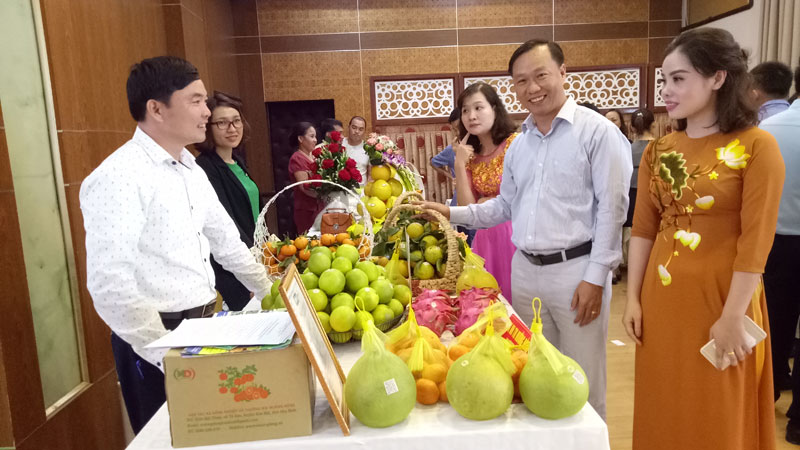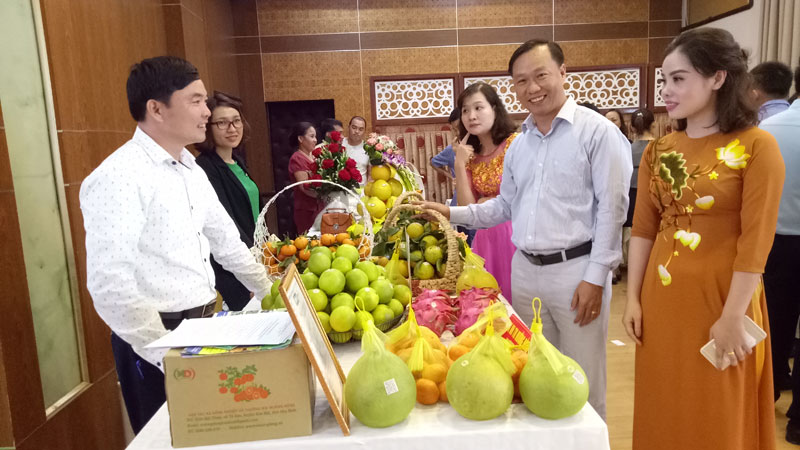
(HBO) – Hoa Binh province boasts multiple advantages for trading activities with its location as a gateway to the northwestern region and a convenient transport system linking it with other provinces in the Red River Delta and the northeastern and central regions. However, promoting connectivity and partnership between cooperatives and purchasers is still considered an important step in trade promotion.
A
representative of the Ho Chi Minh City-based Proton One-Member Co. Ltd (second
from right) discusses cooperation in selling fruits at wholesale markets in HCM
City with the Muong Dong agricultural services and trading cooperative (Kim Boi
district).
Supporting trade promotion is key to strengthening
the linkage between producers and consumers.
A supply - demand connection conference was held
in mid-November, gathering businesses, supermarkets and distributors from
Hanoi, HCM City and Hoa Binh province, along with 30 agricultural and food
production cooperatives. It was deemed an important step to open up cooperation
chances in product consumption.
The Proton One-Member Co. Ltd, based in Go Vap
district of HCM City, specialises in developing wholesale markets. Its
representative, Nguyen Hong Long, showed his interest in citrus fruits of Hoa
Binh. He expressed the intention to sign contracts to purchase local citrus
fruits, especially oranges, for sale in HCM City.
There are 262 cooperatives across Hoa Binh
province at present, with 197 or 75.2 percent, involving in agriculture. They
have about 11,270 members, and over 19,800 regular workers. Their goods sales
and services revenue surpass 600 billion VND (25.8 million USD), averaging 2.3
billion VND per cooperative.
Recently, many cooperatives have promoted
connectivity to produce key agricultural products under value chains. With
traceable origin, their products have high and consistent quality while meeting
food safety standards. They have been sold in Hanoi and some other provinces
nationwide and won consumers’ trust./.
According to data from the Hoa Binh Provincial Party Committee, the industrial production index for the first six months of 2025 is estimated to have increased by 20% compared to the same period last year. This marks the highest year-on-year growth rate for this period since 2020.
In the first six months of 2025, Hoa Binh province’s export turnover was estimated at 1.145 billion USD, marking an 18.11% increase compared to the same period in 2024. Import turnover was estimated at $ 804 million, a 17.15% increase, which helped the province maintain a positive trade balance.
The lives of the ethnic minority farmers in Tan Lac district have gradually improved thanks to the new directions in agricultural production. This is a testament to the collective strength fostered through the professional associations and groups implemented by various levels of the district’s Farmers’ Union.
With the motto the "product quality comes first,” after nearly one year of establishment and operation, Muong village’s Clean Food Agricultural and Commercial Cooperative, located in Cau Hamlet, Hung Son Commune (Kim Boi district), has launched reputable, high-quality agricultural products to the market that are well-received by consumers. The products such as Muong village’s pork sausage, salt-cured chicken, and salt-cured pork hocks have gradually carved out a place in the market and they are on the path to obtaining the OCOP certification.
In the past, the phrase "bumper harvest, rock-bottom prices" was a familiar refrain for Vietnamese farmers engaged in fragmented, small-scale agriculture. But today, a new spirit is emerging across rural areas of Hoa Binh province - one of collaboration, organisation, and collective economic models that provide a stable foundation for production.
Maintaining growing area codes and packing facility codes in accordance with regulations is a mandatory requirement for agricultural products to be eligible for export. Recently, the Department of Agriculture and Environment of Hoa Binh province has intensified technical supervision of designated farming areas and packing facilities to safeguard the "green passport" that enables its products to access international markets.



